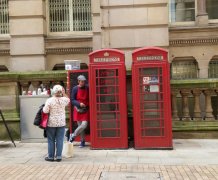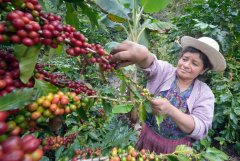Sexism in coffee cups-what is a cup of coffee that discriminates against women?
For professional baristas, please follow the coffee workshop (Wechat official account cafe_style)
With the increase in the number of people who drink coffee, more and more people are concerned about the exploitation of the coffee market. This is followed by more reflection on the coffee industry and poverty, such as the recommendation written by the pioneers of Taiwan's fair trade movement for "Sister entrepreneurs in Poor villages": "if you know, you may shout!" It turns out that a mouthful of coffee may swallow a society that discriminates against women. in fact, behind the products we can't see, the production process also involves the issue of gender inequality. "

Rama Rahmah, founder of coffee farmers' cooperative in KOPEPI KETIARA, Indonesia (second from left)
The Indonesian KOPEPI KETIARA coffee farmers' cooperative, which came to Taiwan last year, was set up to break the Indonesian coffee market monopolized by men. Because in traditional Indonesia, men not only dominate the family, but also dominate the coffee industry.
Rahmah, the founder of KOPEPI KETIARA, has worked in the traditional coffee industry for more than 20 years. Seeing that female workers are not treated properly, he is determined to set up a coffee farmers' cooperative dominated by women, so that women's efforts and talents can be fully demonstrated and reasonably paid.
Rahmah said that joining the International Fair Trade Organization is their only way out, and fair trade is not about certification, but the transaction mechanism behind it, openness and transparency, ensuring a purchase price, providing access to the international market, and promising women a truly equal space for development, improving women's social status and bringing them fairer development opportunities.
When a place suffers from a natural disaster or needs assistance, the Cooperative Community Development Fund will be used to help local residents, regardless of whether they are members or non-members. If they had not joined the International Fair Trade Organization, such a good taste might not have occurred.
Female workers "high output, low income"
It may be difficult for us to imagine that women are the main source of agricultural labor in developing countries. They spend a lot of time in charge of the vast majority of production and processing operations, but because men own most of the property and land ownership, they tend to get only 10% of the income, which is out of proportion to the labor force.
This is particularly true in the coffee industry, where women complete more than 70% of the production and repackage work, but actually own less than 20% of the coffee resources (whether it's land, income or company ownership).
Coffee produced by female workers
In order to improve this phenomenon, the Fair Trade Coffee Cooperative CAC (Cooperativa Agraria Cafetalera Pangoa) in Peru began to advocate buying coffee grown by women, then using the earned money to invest in industrial equipment and projects, giving it back to growers, and combining a variety of crops to increase production to attract more international buyers. CAC, whose managers are mostly women, has also set up a related unit dedicated to the development of women. The running voice of CAC has made this topic jump on the world stage and been reflected and discussed by everyone.
The example of the coffee industry is just a drop in the ocean. There are gender imbalances in various aspects in every corner of life, but there are differences that are concerned or ignored from large to small. There is still a long way to go to bridge this gender gap.
Important Notice :
前街咖啡 FrontStreet Coffee has moved to new addredd:
FrontStreet Coffee Address: 315,Donghua East Road,GuangZhou
Tel:020 38364473
- Prev

A phone booth can also be turned into a coffee shop! The whole city has become my cafe!
Professional barista communication please pay attention to the coffee workshop (Wechat official account cafe_style) in recent years, mobile phones have been popularized, telephone booths and public telephones have been gradually eliminated, but telephone booths have also been given new functions! British telephone booths appeared on the streets of Britain in 1920 when the first British telephone booth Kiosk No.1 (K1 for short) appeared on the streets of England. After continuous revision for nearly a century, it is now very difficult.
- Next

Spend 70% of our labor just to make a cup of coffee in our hands-- the great her.
Professional baristas exchange please follow the coffee workshop (Wechat official account cafe_style) Fair Trade Coffee is fair? With the increase in the number of people who drink coffee, more and more people are concerned about the exploitation of the coffee market. With the rise of Fairtrade coffee, small coffee farmers can get a guaranteed purchase price and continue to make ends meet. With it, there are more.
Related
- What grade does Jamaica Blue Mountain No. 1 coffee belong to and how to drink it better? What is the highest grade of Blue Mountain coffee for coffee aristocrats?
- What are the flavor characteristics of the world-famous coffee Blue Mountain No. 1 Golden Mantelin? What are the characteristics of deep-roasted bitter coffee?
- Can I make coffee a second time in an Italian hand-brewed mocha pot? Why can't coffee be brewed several times like tea leaves?
- Hand-brewed coffee flows with a knife and a tornado. How to brew it? What is the proportion of grinding water and water temperature divided into?
- What is the difference between Indonesian Sumatra Mantinin coffee and gold Mantinin? How to distinguish between real and fake golden Mantelin coffee?
- What does bypass mean in coffee? Why can hand-brewed coffee and water make it better?
- Unexpected! Ruixing Telunsu lattes use a smoothie machine to foam milk?!
- % Arabia's first store in Henan opens into the village?! Netizen: Thought it was P's
- Does an authentic standard mocha coffee recipe use chocolate sauce or powder? Mocha Latte/Dirty Coffee/Salty Mocha Coffee Recipe Share!
- What is the difference between Vietnam egg coffee and Norway egg coffee? Hand-brewed single product coffee filter paper filter cloth filter flat solution!

